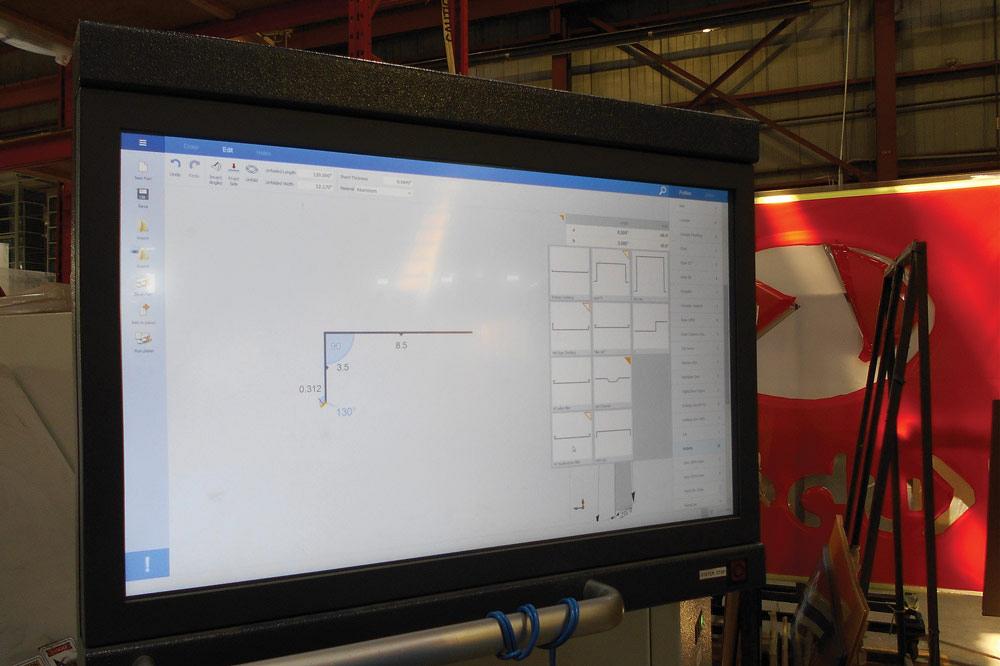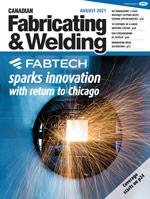- FMA
- The Fabricator
- FABTECH
- Canadian Metalworking
Signs of changing times at Teksign
Brantford, Ont.-based Teksign invests in new folder to increase throughput, simplify operations
- September 9, 2021
- Article
- Fabricating
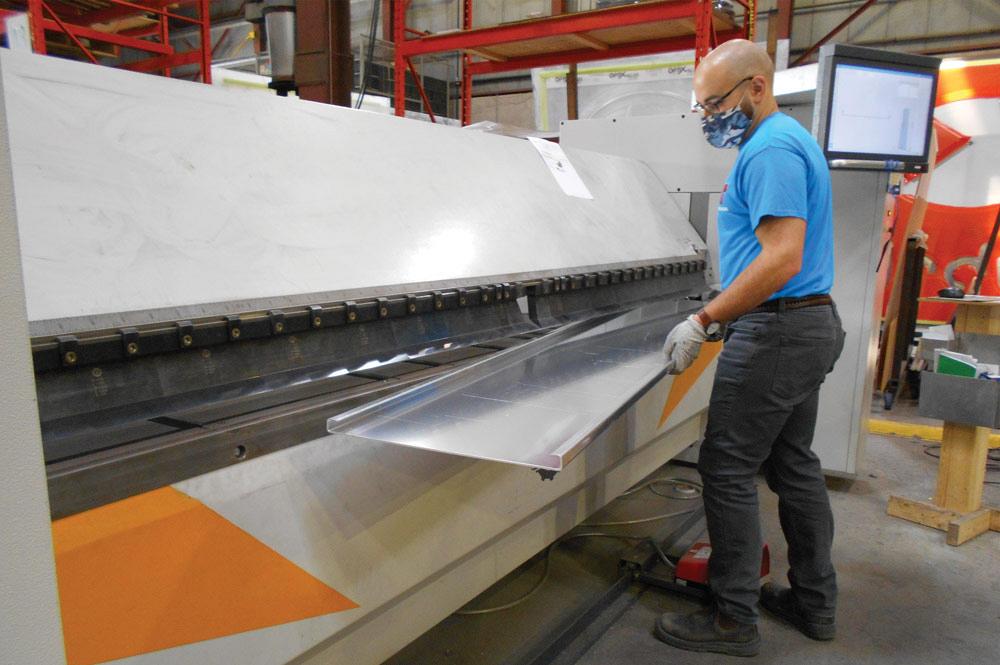
The RAS TURBO2plus system has a 10-ft. bend length and accommodates tool heights up to 127 mm. Photos: Teksign
When Brantford, Ont.-based signage supplier Teksign wanted to update its bending processes, it had to decide what technology made the most sense for its high-mix/low-volume production needs. The nature of its work led to an investment in a CNC-equipped folder.
Storied History
Teksign was established in 1946 as Technical Plastics. It originally manufactured plastic household items for the kitchen. Soon, however, its focus shifted to building backlit signage. In the 1950s it built signs for many early petroleum companies, and in 1976 expanded its sales across North America.
The company remains busy today, with a shop floor team of about 14 making signs for the petroleum industry, automotive, hotels, and agricultural equipment suppliers, among others. Most of the metal used in the fabrication of its signs is either aluminum or aluminum composite material (ACM) panels, a material that is lighter and easy to form and install.
“The heaviest material we form is 1/8-in. aluminum,” said Jim Hahn, production control manager at Teksign.
In 2019 the company decided that it was time to update its forming capabilities.
“We were using an older press brake,” said Hahn. “The value of it for a long time was that it had a 16-ft. bed, which was helpful for forming 12-ft. parts. However, changes in the industry mean that parts of that length aren’t as common as they once were.”
The press brake was labour-intensive for the work that Teksign does.
“With the press brake, the operator would have to set up for every single bend every time,” said Hahn. “It would take two operators to manage the bends on a number of the jobs we did.”
Flexible Folding
The interesting aspect of the work Teksign does is that many projects are repeat business, even though each may involve a short run. For instance, every Pioneer gas station sign has the same dimensions. Other companies may have three different sizes of signage mounted on pylons outside their businesses, but that is the extent of their variability.
This made investing in a CNC-equipped folding machine a natural fit for Teksign’s forming operations. It chose to invest in a RAS TURBO2plus system, purchased through Westway Machinery. This machine includes the RAS Bendex software, which automatically programs parts, offers alternative bending strategies, and shows the bending sequence on the monitor in 3D for the operator. It has a 10-ft. bend length and accommodates tool heights up to 127 mm.
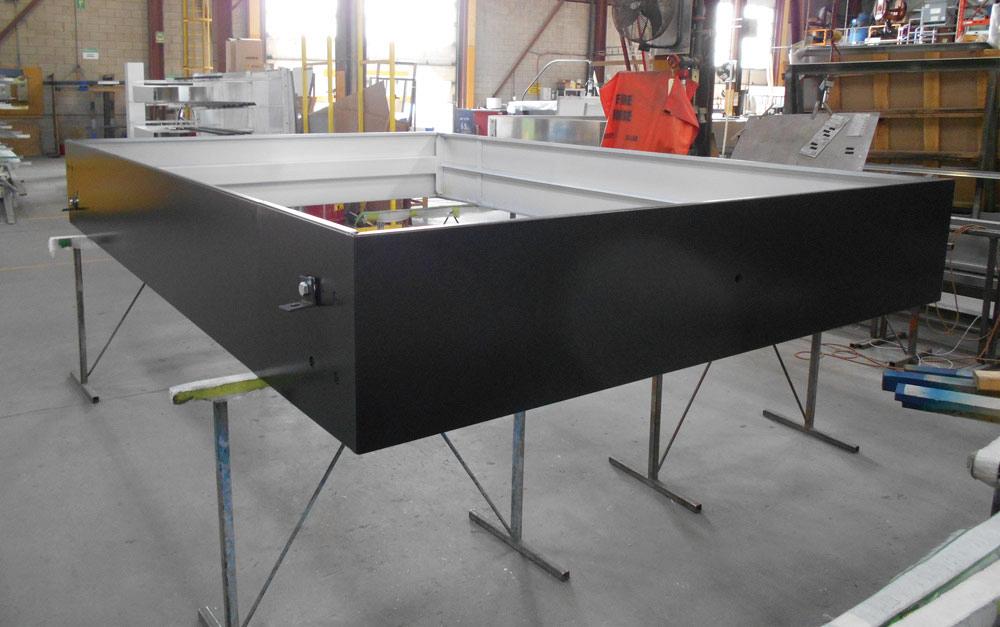
This is an example of a filler, which is formed to make the box that holds LED lighting and power supplies to light up a sign.
“With the new machine, we can program it so that if I have to go back and make another filler for Kubota, for instance, I just have to bring up the program for the correct size filler and it’s all set,” said Hahn. “Its ability to store a significant number of programs simplifies our bending operations substantially. I would say that we are cutting our forming time by 50 to 60 per cent just in setup time alone, between our former requirements of having to change up dies and other actions. Now we can build much more much faster, because we can easily switch from one job to another with the press of a few buttons. It also frees up one person because the machine can be run by one person. It frees up team members to do work elsewhere in the shop, whether that be shearing material to support the folder, assembling signs, or electrical wiring. Most of our team can tackle any of these jobs, so it’s helpful to free up their time like that.”
Simplified Maintenance
At one point Teksign had 24 people on the shop floor.
“With this and some other upgrades in the shop, we are able to produce as much, if not more, with the team we have today,” said Hahn.
Like with many other CNC-equipped systems, maintenance concerns are easily managed remotely.
“We have learned how to tweak the machine to do certain things we want with it, and RAS has been able to help us remotely with any questions we’ve had,” said Hahn. “Their team can take over our machine if we need something fixed or want something better explained. It makes it very user-friendly.”
The consistency of this type of machine also helps in other parts of the manufacturing process.
“We have our own vacuum forming machine,” said Hahn. “We know our filler is going to be exactly the same every time with this machine so we can count on precision at every point of the manufacturing process.”
Teksign Inc., www.teksign.com
RAS Systems, www.ras-systems.com
Westway Machinery, www.westwaymachinery.com
subscribe now


Keep up to date with the latest news, events, and technology for all things metal from our pair of monthly magazines written specifically for Canadian manufacturers!
Start Your Free Subscription- Trending Articles
CWB Group launches full-cycle assessment and training program
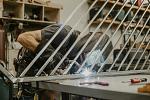
Achieving success with mechanized plasma cutting
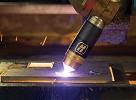
3D laser tube cutting system available in 3, 4, or 5 kW
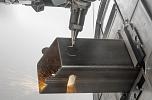
Brushless copper tubing cutter adjusts to ODs up to 2-1/8 in.
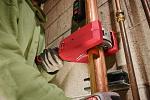
Welding system features four advanced MIG/MAG WeldModes
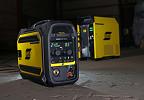
- Industry Events
MME Winnipeg
- April 30, 2024
- Winnipeg, ON Canada
CTMA Economic Uncertainty: Helping You Navigate Windsor Seminar
- April 30, 2024
- Windsor, ON Canada
CTMA Economic Uncertainty: Helping You Navigate Kitchener Seminar
- May 2, 2024
- Kitchener, ON Canada
Automate 2024
- May 6 - 9, 2024
- Chicago, IL
ANCA Open House
- May 7 - 8, 2024
- Wixom, MI













